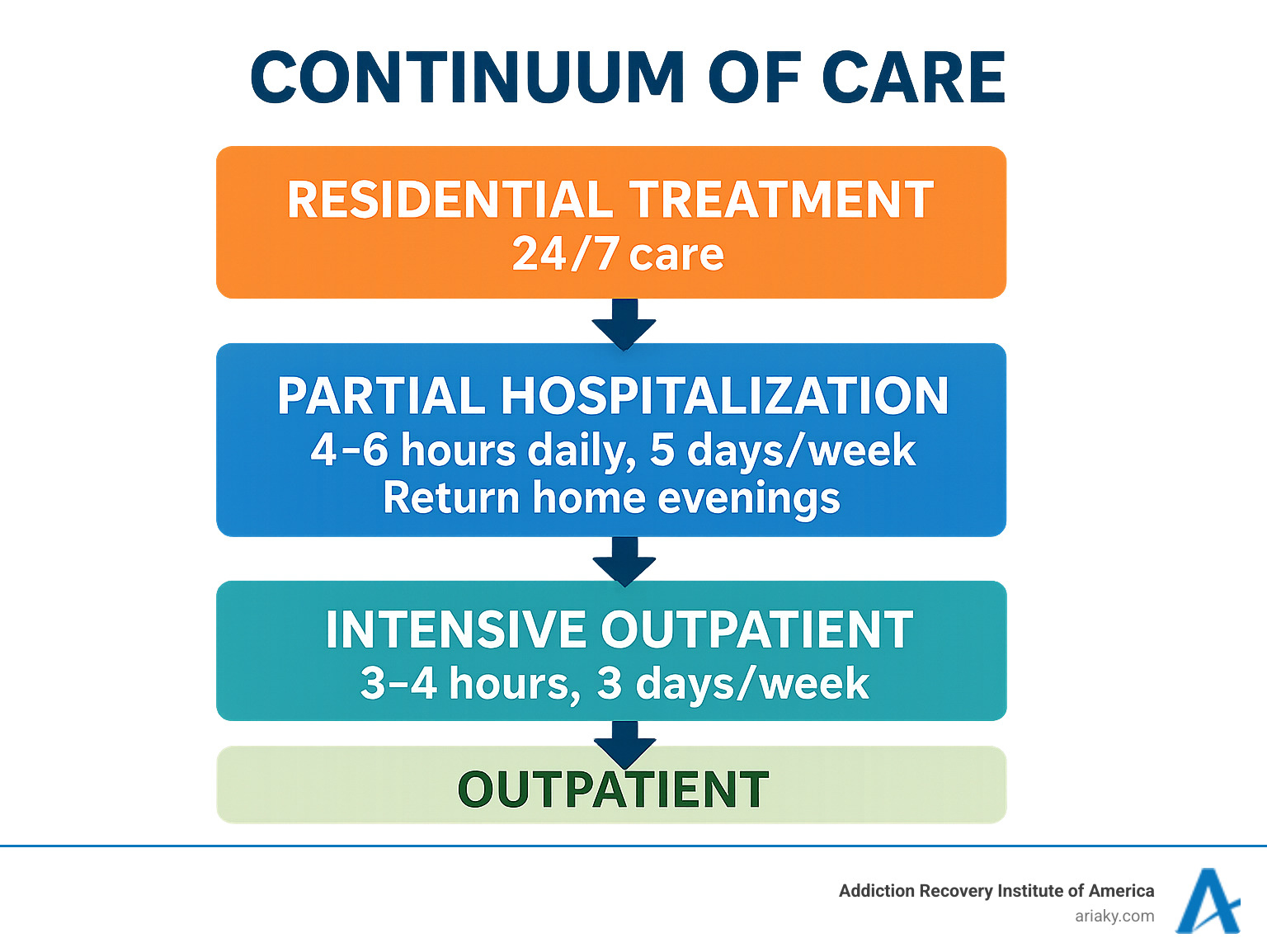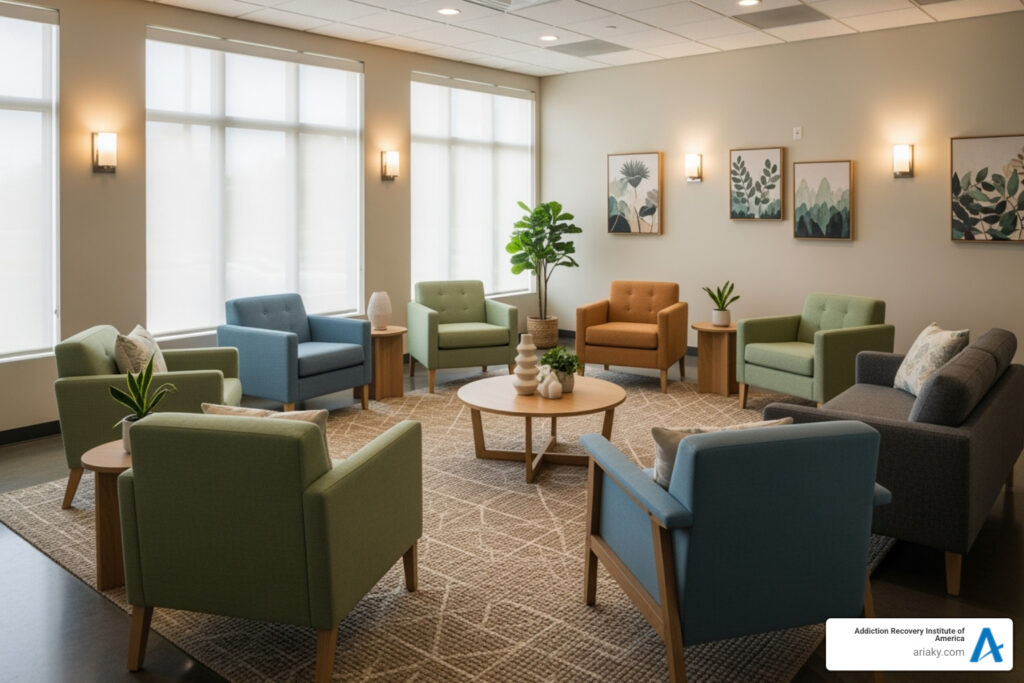Understanding Your Treatment Options in Kentucky
Kentucky partial hospitalization programs offer intensive mental health and substance use treatment while allowing you to return home each evening. These programs bridge the gap between residential treatment and standard outpatient care, providing structured support for those who need more than weekly therapy but don’t require 24-hour supervision.
Quick Facts About Kentucky Partial Hospitalization:
- Duration: Typically 4-6 weeks
- Schedule: 4-6 hours per day, 5 days per week
- Coverage: Available for ages 6-21 and adults 65+ through Kentucky Medicaid
- Setting: Day treatment with evening return home
- Services: Individual, group, and family therapy; medication management
- Cost: Often covered by insurance, including Medicaid
When facing addiction or mental health challenges, finding the right level of care is crucial. If you’re stepping down from inpatient treatment or find that outpatient therapy isn’t enough, partial hospitalization programs (PHP) are an excellent option.
PHP in Kentucky serves people with significant impairment to daily functioning due to substance use disorders, mental health conditions, or both. These programs provide at least four hours of intensive treatment per day, addressing a primary issue while also managing co-occurring disorders.
Kentucky’s PHP options use evidence-based treatments like Cognitive Behavioral Therapy (CBT) and Dialectical Behavior Therapy (DBT) to help you develop coping skills for lasting recovery while staying connected to your community.

A Closer Look at Kentucky Partial Hospitalization (PHP) Programs

When you need intensive treatment but want to sleep in your own bed, Kentucky partial hospitalization programs offer a perfect middle ground. They provide structure and support while letting you stay connected to your family and community. PHP is especially effective at treating co-occurring disorders (or dual diagnosis), where addiction and mental health issues like depression or anxiety exist together. By addressing everything at once, PHP gives you a better chance at lasting recovery. You get hospital-level care during the day and go home to practice what you’ve learned. For more details, see our Kentucky Addiction Treatment Therapy Programs.
What a Typical PHP Schedule Looks Like
Your day in a Kentucky partial hospitalization program follows a structured routine. Most programs run 4-6 weeks on average, depending on your progress. You’ll attend treatment 5 days a week (Monday-Friday) for 4-5 hours each day, often in the morning. This schedule provides intensive treatment while leaving evenings free for family, work, or applying your new skills. Daily activities include a mix of therapies:
- Group therapy is the core of PHP, allowing you to share experiences with peers under the guidance of licensed therapists.
- Individual counseling provides one-on-one time to work on personal challenges and treatment goals.
- Family therapy sessions help heal relationships and teach loved ones how to support your recovery.
- Medication management is available with regular check-ins to ensure any medications are working effectively.
Services and Therapies Offered
Therapies in Kentucky partial hospitalization programs are evidence-based and custom to your needs.
- Cognitive-Behavioral Therapy (CBT) helps you identify and change negative thought patterns that fuel addiction and mental health struggles.
- Dialectical Behavior Therapy (DBT) teaches vital skills in mindfulness, distress tolerance, emotion regulation, and interpersonal effectiveness.
- Trauma-informed care creates a safe space to heal from past painful events without judgment or re-traumatization.
- Experiential therapy, such as art or music therapy, helps you process emotions and find new coping mechanisms.
- Psychoeducation provides knowledge about addiction as a disease, fostering self-compassion and commitment to recovery.
- Relapse prevention planning equips you with a roadmap to identify triggers and handle high-risk situations.
Our specialized programs can help with various substance use disorders. Learn more about our Alcoholism Treatment Programs and Opioid Addiction Treatment Program.
The Professional Team Supporting Your Recovery
In Kentucky partial hospitalization, a multidisciplinary team works together to support your recovery. This team includes:
- Licensed therapists (LPCCs, LCSWs) who provide individual, group, and family therapy.
- Psychiatrists and nurse practitioners who handle medical care and medication management.
- Clinical social workers who connect you with community resources and help with practical challenges.
- Licensed drug and alcohol counselors who bring specialized expertise in addiction treatment.
This team meets regularly to discuss your progress and adjust your treatment plan, ensuring everyone is working toward your lasting sobriety and mental wellness. To learn more, visit our Kentucky Substance Abuse Treatment Center page.
PHP vs. Other Levels of Care in Kentucky

Understanding how Kentucky partial hospitalization fits within the continuum of care is key to choosing the right path. Treatment options exist on a spectrum, and you can move between levels based on your needs.
PHP sits between residential treatment and outpatient care, offering intensive support for those who don’t need 24/7 supervision but require more than weekly therapy. This step-down approach recognizes that recovery is not one-size-fits-all. The goal is to find the right intensity of support for where you are right now.
| Feature | Residential Treatment | Partial Hospitalization (PHP) | Intensive Outpatient (IOP) |
|---|---|---|---|
| Hours/Week | 24/7 care, highly structured | 20+ hours (4-5 hours/day, 5 days/week) | 9-15 hours (3 hours/day, 3-5 days/week) |
| Living Situation | Live at the facility | Live at home (or sober living) | Live at home (or sober living) |
| Structure Level | Highest | High | Moderate |
| Medical Oversight | Constant | Daily/frequent access to medical staff | Periodic access to medical staff |
| Ideal Candidate | Severe addiction/mental illness, needs stabilization | Needs intensive daily support but can live at home | Stable, needs ongoing support, maintains work/school |
Partial Hospitalization vs. Residential Treatment
The main difference is where you sleep. In residential treatment, you live at the facility 24/7. This is often necessary for severe addiction, medical detox, or if your home environment is unsafe. Learn more at our Residential Treatment Program KY page.
PHP provides the same intensive daily therapy, but you return home each evening. This allows for immediate real-world application of coping skills. You can address challenges from your daily life in therapy the very next day. PHP is also more cost-effective than residential care since it doesn’t include room and board, potentially allowing for a longer duration of treatment.
Partial Hospitalization vs. Intensive Outpatient Program (IOP)
While both PHP and IOP allow you to live at home, they differ in intensity. PHP is like a training camp, while IOP is more like ongoing coaching. PHP involves 20 or more hours of treatment per week, typically five days a week. This intensive schedule is ideal if you need significant daily structure.
IOP steps down to 9 to 15 hours per week over three to five days, which works well once you’ve achieved some stability. Many people transition from PHP to IOP as they progress. PHP also offers more frequent access to medical staff, which is crucial for medication adjustments or managing co-occurring conditions. The choice depends on your current stability and support needs. Learn more about this option at our Intensive Outpatient Program (IOP) Kentucky page.
Navigating Access to a Kentucky Partial Hospitalization Program

Taking the first step toward a Kentucky partial hospitalization program doesn’t have to be complicated. We can walk you through the process, from determining if PHP is right for you to navigating insurance coverage. Our team at Kentucky Drug & Alcohol Rehab Programs is experienced in making this process as smooth as possible.
Eligibility and Admission Criteria
PHP is for individuals who need more support than weekly therapy but don’t require 24/7 supervision. The key factor is medical necessity, meaning your current situation requires the intensive daily structure of PHP. You might be a good fit if mental health or substance use issues cause significant functional impairment in your daily life, such as at work or in relationships.
You must be stable enough to safely go home each evening. Many participants are stepping down from inpatient treatment or have found that lower levels of care haven’t been enough. If you need medical stabilization for severe withdrawal, you might start with a program like our Heroin Detox before transitioning to PHP. We can help you find the right starting point.
Insurance and Medicaid Coverage for PHP
Figuring out insurance can be stressful, but most plans, including Kentucky Medicaid, often cover Kentucky partial hospitalization. We work with major insurance providers to help you maximize your benefits.
Most plans require prior authorization, meaning your insurance company must agree that PHP is medically necessary before you start. Our team handles this process for you. If you have Kentucky Medicaid, your services are likely managed by a Managed Care Organization (MCO) like Anthem, Aetna, or Humana. It’s crucial to verify that your chosen program is in-network with your MCO.
Kentucky’s regulations, such as Kentucky Administrative Regulations, Chapter 10, Section 907 KAR 10:016, outline what services are covered. Verifying your benefits is the best first step, and we are happy to do this for you. Don’t let cost concerns prevent you from seeking help; we are committed to making treatment accessible.
Specialized PHP Tracks for Different Needs
Effective Kentucky partial hospitalization programs are not one-size-fits-all. Specialized tracks for adults and adolescents recognize that different life stages require different approaches to treatment. A working parent needs different support than a high school student, and both deserve care that fits their world. For a complete overview, visit our Partial Hospitalization Program (PHP) Kentucky page.
PHP for Adults
Adult PHP programs are structured to work with your life. The model provides intensive therapy during the day while allowing you to return home each evening, so you can maintain work and family responsibilities. This structure lets you practice new coping skills in real-world situations immediately.
These programs often focus on DBT-informed care, which teaches practical skills for mindfulness, distress tolerance, emotion regulation, and interpersonal effectiveness to help you build a life worth living. A core component is addressing mental illness alongside substance use disorders, as these conditions are often linked. Treating both simultaneously builds a stronger foundation for lasting recovery.
PHP for Children and Adolescents
PHP for young people uses a completely different approach, custom to their developmental stage. Programs serving ages 5-18 recognize that kids and teens have unique needs related to school and family dynamics.
Key features of youth PHP include:
- Integrated academic support, often in partnership with local schools, to ensure students don’t fall behind academically.
- Point-based incentive systems to motivate and engage young people in their treatment.
- Mandated family therapy to heal the family system and teach parents how to provide effective support at home.
- Structured transition to community and school, which is vital for helping youth reintegrate successfully after a higher level of care.
Frequently Asked Questions about Kentucky PHP
It’s natural to have questions when considering a Kentucky partial hospitalization program. Here are answers to some of the most common inquiries we receive.
How long does a typical PHP program last in Kentucky?
Most PHP programs last an average of four to six weeks. However, the length of your stay is progress-based, not calendar-based. Your treatment team will work with you to create a transition plan for when you’ve developed the necessary coping skills and are ready to step down to a lower level of care, like an Intensive Outpatient Program.
Can I work or go to school while in a PHP?
Yes, it’s possible, depending on your schedule’s flexibility. PHP typically requires a commitment of four to five hours a day, five days a week. If you work evenings or weekends or can arrange a flexible schedule, you can maintain your responsibilities. For students, many youth programs integrate academic support into the daily schedule, so you can get treatment without falling behind in school. This allows for the real-world application of skills learned in therapy.
How do I find the right Kentucky partial hospitalization program for me?
Finding the right fit is a key step. Here’s how to start:
- Get a professional assessment: Most reputable centers offer a no-cost evaluation to determine if PHP is the right level of care for you.
- Check insurance compatibility: Ask the program to help verify your benefits. They can handle prior authorization and confirm they are in-network with your insurance or Medicaid MCO.
- Look for program specialization: Find a program that treats your specific needs, such as dual diagnosis or trauma-informed care.
- Consider practical factors: Location is important, as you’ll be commuting daily. Also, ensure the program offers therapies that resonate with you, like CBT or DBT.
For more guidance, check out our Outpatient Treatment Program KY page.
Taking the Next Step Toward Recovery
Recovery is a journey, and considering a Kentucky partial hospitalization program is a courageous first step. PHP offers the possibility of intensive healing while allowing you to stay connected to your life, sleeping in your own bed and seeing your family each evening.
At the Addiction Recovery Institute of America (ARIA), an accredited, AODE-certified addiction rehab center in Kentucky, we are your partners in building a better life. Our individualized care philosophy means your treatment plan is designed specifically for your needs. We offer a full spectrum of care, from detox to PHP and IOP, so we can support you through every stage of your recovery.
Our programs focus on building practical coping skills that work in real life, helping you thrive, not just survive. The path to lasting sobriety isn’t always easy, but with the right support system, it is possible. Our compassionate team is here to honor your bravery with the highest quality care.
If you’re ready to explore your options, our confidential assessment process will connect you with the most appropriate level of care. You don’t have to do this alone. Find the right level of care for you in Kentucky and take that brave step toward the life you deserve.

